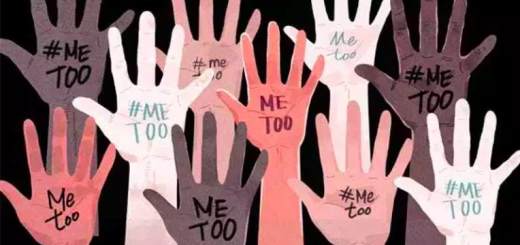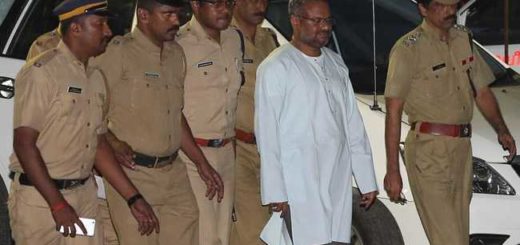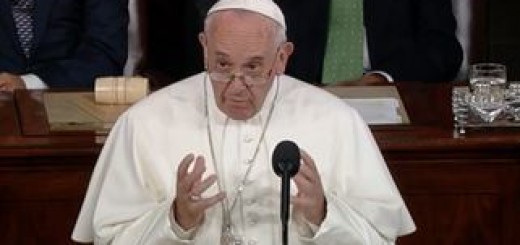One Nation Under RSS – Indian Currents

“We the minorities are no more safe in today’s India,” came in a panic-stricken voice as I attended a call on my mobile phone in the wake of the recent attacks on Churches in and around Delhi. Well, it is this telephonic anxiety poured in days ahead of the ‘Minority Rights Day’ annually observed in India on December 18 that triggered this piece.
India’s Minorities’ fears are indeed on the rise: “Ever since the majority community has captured power at the Centre, minority-bashing across India occur with impunity. It’s time to wake up and alert our fellow citizens on the perilous march of the present government leading this great nation into a fascist country!”
These thoughts lead to further unease: “Why are the sane members of the majority community silent on this growing violation of the Indian Constitution? Where are those millions of educated and enlightened Hindus? Has the communal fringe succeeded in turning the majority to support religious fanaticism, constantly being fed through social media network?”
The minority-majority divide of the Indian polity is nothing new. It has been constitutive of India’s vast territory and the huge population bewilderingly diverse in creed, culture, customs, tradition and language. However, the communal or religion-based minority-majority divide is not very old, as communalism itself is a phenomenon that raised its ugly head around the partition of India. The Indian nationalists like Mahatma Gandhi, Subhash Chandra Bose, Pt. Jawaharlal Nehru, Azad and others detested this evil.
They were great minds that detested the idea of Indian nationalism based on a homogenized Hindu identity and instilled in the minds of the people the fact that India is destined to be a multi-religious, multi-lingual, multi-cultured society. They asserted that no community, however big or small, can devour the other. Because, even the best effort of any one particular community albeit its numerical strength to overpower the other is bound to backfire. Hence we as a people ought to evolve a lifestyle of tolerance and forbearance at least as a minimum of a loving acceptance of each community who lives here.
The wise words of M.N. Roy are worth recalling here: “Ours is a radical and rationalist approach. As long as Indian nationalism remains religious, there will be communal problem. Therefore we must secularize nationalism. Secondly, as long as there are prejudices, we have to go down to the level of the psychology with the object of eradicating them. Thirdly, we have to remove all distrust and make the masses conscious of their real interest and understand how to promote it.”
Thus, the political leadership of Independent India unanimously accepted pluralism as the basic tenets of its political philosophy which enables the Hindus, Muslims, Christians, Sikhs, Parsees and Buddhists to live together as ‘Indians’ first and last. While pluralism for the western world was a new concept that demands assimilation, the Indian brand of pluralism stands for integration without losing individual identities of each stream of people that makes the ocean of Indian population. In other words, the enlightened political leadership of the nascent Independent India had the wisdom to go for a deliciously multi-flavoured ‘salad bowl’ rather than a ‘melting pot’ where the richness of each specific identity will be lost.
The great makers of the Indian Constitution were noble men of far sight who could foresee the possibility of such game plan of the majority to dominate over the minorities in Independent India. In their discretion they’ve included some special provisions in the Constitution of the country for the safe space of the minorities and protection of their institutions and interests. They were convinced that by no stretch of imagination can India be a country of just one straight-jacketed community of people. They knew that the idea of India is too sublime to be debased into a nation of ‘one culture, one religion, one language’, akin to the detestably failed Nazi slogan ‘Einvolk, ein Reich, ein Fuehrer’ (one people, one state, one leader) of old. Human history witnessed the worst annihilation of fellow human beings in the hands of the Nazis who based their actions on the insane notion of ‘one state, one race, and one leader’ hegemony. The scar it has left on the face of humanity tells of a hate-ideology that shudder every sane human being.
One should realise that there’s nothing called ‘Hindu national culture’, for that matter, no nation can claim an exclusive culture because world over, national cultures grew out of many international conflicts and contacts. Indian culture too is no exception and was born out of the contact, conflict and interplay of the Austric, Dravidian, Mongoloid and Aryan worlds. Contacts with peoples from outside India in ancient and medieval times facilitated the growth of the Indian national culture. It has been the contact with the Old Persian people under the Achaeamenid Empire followed by the Iranian Sakas and Pahlavi-using Persians of the Middle Iranian age, with the Greeks under Alexander the Great and in the following centuries, with the Hunas and the Turuskas or pre-Moslem Turks that added new material, intellectual, religious and spiritual elements to Indian civilization. India owes much to the Greeks and Iranians for their contributions to the growth of art and architecture, policy and the organization of the state. But what has been admirable about this people of the early Middle Ages who settled in India in large numbers is that they did not bring a militant and an exclusive faith that looked upon all others as people ‘born illegitimate’.
The love-ethics of Jesus Christ, the messages of Buddha, Mohammad together with the political philosophies of Asoka and Akbar, the poetry of Guru Nanak and Kabir, the syncretism of Sufism, The Religion of Man and Vishwamanava of Tagore and Aurobindo, the spirituality of Vivekananda and Gandhiji are central to our national heritage, insuring each equal protection of the law.
Unfortunately since a few decades, the word ‘national’ has been used for playing power politics that divide the people of India on religious, linguistic and even scriptural lines! The recent demand for making Bhagavad Gita the national scripture to be taught in schools across India, replacing German language with Sanskrit, the aversion towards English et al are part of this calculated game unashamedly being played by the present dispensation in India.
That the poisonous communal wind blowing across India announcing the degeneration of Indian politics that has endorsed the ascendancy of a communal party based on a hate ideology is not impalpable. Communalism is a type of consciousness among a particular community that claims to be superior to all other communities either by religion or numerical strength hence tries to subjugate others by blackmailing them and even by physically attacking them. The well-calculated, systematic and cunningly spaced attacks on Churches, Christian personnel and their institutions are recent testimonies of the violation of the minorities’ rights guaranteed in the Constitution of India. Uttering mere slogans of democracy, nationalism and inclusive development et al are of no use sans creating a political value system suited to a secular democracy that India is. India of 21st century cannot but eschew all traits of superstition and replace it with scientific temper and a democratic humanism.
The minority status is attributed to a community or group which is quantitatively or qualitatively weak in comparison to the dominant community that outnumber the others and in a position to wield greater influence on the society and the government. Such relative differences do exist between the groups everywhere that creates a feeling of superiority (majority community) and inferiority (minority community). The Physical existence of the majority – minority divide is an outcome of the differential treatment these groups experience. While the majority enjoys all or most of the privileges, the minority is to be contented with few privileges or be totally deprived of them. To bring forth a just society, hence, the Constitution of free India in its very Preamble has guaranteed the rights to equality, justice and freedom to all its citizens irrespective of caste creed and religion. And these rights unambiguously are spelt out through various articles meant to protect the minorities and to respect their specific interests.
The Indian Constitution has given considerable recognition to a number of languages in the Eighth Schedule and there are five religious groups which have been given the official status of National Minorities, namely, Muslims, Christians, Sikhs, Buddhists and Parsees. Giving thoughtful attention to the minority problem in all its facets, the framers of our Constitution have provided constitutional safeguards for the welfare of the minorities in India. Unfortunately in the present India what we obtain is an aggressive majoritarianism that violates the Constitutional provisions and oppresses the minorities with impunity. The Christian minority community in India makes no big demands from the state, however it asks for a safe survival space where it is allowed to obtain its fundamental rights guaranteed to every citizen in the constitution of India. Unfortunately, the growing apathy of the administration towards Christian minority and frequent violation of their rights are extremely frustrating in today’s India. The recent attack on Churches and Christian personnel at various places in India has shaken the community’s confidence in the government and the constitutional safeguards.
Minority issues are increasingly taking centre stage in Indian politics, be they appear as separatist movements, demands for increased political representation, or the need to provide protection to its many religions and cultures. However, most of these conflicts are yet to be resolved and the challenge for India is to put in place processes that enable minority problems to be discussed and resolved for the benefit of the country as a whole, while ensuring the collective survival of the many minority peoples who form an integral part of the country. The growing religious fanaticism in India is a worrisome trend that creates a fear psychosis among the religious minorities of India. We the people of India who were freed from the foreign yoke through nonviolence and satyagraha has a collective obligation to safeguard and promote the rights of the minorities, nurture the traditions of democracy and secularism that have been the characteristic of constitutional and political developments of post-independence India.
The Indian brand of Pluralism cannot be left value neutral, but recognize the very specific values of Hindus, Muslims, Christians, Sikhs, Buddhists and others along with their respective heritages. Traditions are part of our moral ecology; hence ought to be protected, not dissolved, and never attacked by the dominant tradition. For this to happen, India should form a collective conscience free of inter-religious hatred and suspicion. The Central and State governments of the country, by the sacredness of the oath and adherence to the Constitution of India, must see to the safety of all citizens irrespective of the minority-majority divide. India needs to develop a saner political vocabulary richer than just ‘rights’ to protect the safe space of the diverse communities especially that of the minorities. Indians needs to, as Horace Kallen (the American philosopher who proposed “the symphony of civilizations” in opposition to the “melting pot”) succinctly argues, “develop a set of values that everyone agree upon if they mean to live freely and peacefully together as equals, none penalizing the other for his/her otherness and all insuring each the equal protection of the law.”
While it’s the sacred duty of the government to put in place various safeguards that ensure the survival space of the minorities, they needn’t always be Constitutional or legislative. An enlightened, alert and right-minded civil society can be the most powerful sentinels of minorities’ rights. Violations of minorities’ rights in India first and foremost are violations of their fundamental human rights. Ultimately, it is human beings who have the moral obligation to safeguards the rights of their fellow human beings and take up cudgels against the aberrations of their basic human rights that include the rights of the minorities cutting across all religious and linguistic differences.
















